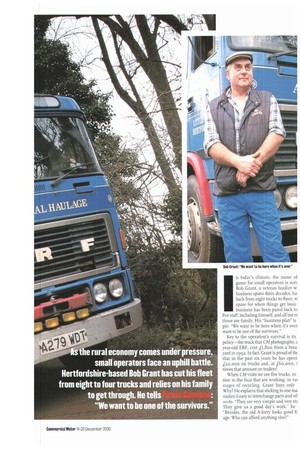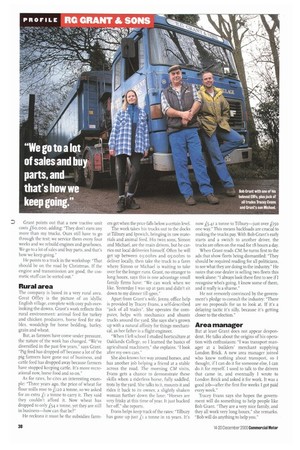n today's climate, the name of game for small operators
Page 39

Page 40

If you've noticed an error in this article please click here to report it so we can fix it.
is sun Bob Grant, a veteran haulier w: business spans three decades, ha back from eight trucks to three, w spare for when things get busy. business has been pared back to five staff, including himself, and all but oi those are family. His "business plan" is ple: "We want to be here when it's over want to be one of the survivors."
Key to the operation's survival is its policy—the truck that CM photographs, a year-old ERF, cost 11,800 from a brea, yard in 1992. In fact, Grant is proud of tin that in the past six years he has spent £20,000 on trucks and. at £60,000, t times that amount on trailers!
When CM visits we see five trucks, in lion to the four that are working, in vai stages of recycling. Grant buys only Why? He explains that sticking to one ma makes it easy to interchange parts and rel units. "They are very simple and very sti They give us a good day's work," he "Besides, the old A-lorry looks good fi age. Who can afford anything else?"
Grant points out that a new tractive unit costs £60,000, adding: "They don't earn any more than my trucks. Ours still have to go through the test; we service them every four weeks and we rebuild engines and gearboxes. We go to a lot of sales and buy parts, and that's how we keep going."
He points to a truck in the workshop: "That should be on the road by Christmas. If the engine and transmission are good, the cosmetic stuff can be sorted out."
Rural area
The company is based in a very rural area. Great Offley is the picture of an idyllic English village, complete with cosy pub overlooking the downs. Grant's work reflects this rural environment: animal feed for turkey and chicken producers, horse feed for stables, woodchip for horse bedding, barley. grain and wheat.
But, as farmers have come under pressure, the nature of the work has changed. "We've diversified in the past few years," says Grant. "Pig feed has dropped off because a lot of the pig farmers have gone out of business, and cattle feed has dropped away because farmers have stopped keeping cattle. It's more recreational now, horse food and so on."
As for rates, he cites an interesting example: "Three years ago, the price of wheat for flour mills rose to LI20 a tonne, so we asked for an extra Li a tonne to carry it. They said they couldn't afford it. Now wheat has dropped to only 154 a tonne, yet they are still in business—how can that be?"
He reckons it must be the subsidies farm
ers get when the price falls below a certain level.
The work takes his trucks out to the docks at Tilbury and Ipswich, bringing in raw materials and animal feed. His twin sons, Simon and Michael, are the main drivers, but he carries out local deliveries himself. Often he will get up between o3:oohrs and 05:oohrs to deliver locally, then take the truck to a farm where Simon or Michael is waiting to take over for the longer runs. Grant, no stranger to long hours, says this is one advantage small family firms have: "We can work when we like. Yesterday I was up at 5am and didn't sit down to my dinner till 9pm."
Apart from Grant's wife, Jenny, office help is provided by Tracey Evans, a self-described "jack of all trades". She operates the computer, helps with mechanics and shunts trucks around the yard. She says she's grown up with a natural affinity for things mechanical, as her father is a flight engineer.
"When I left school I studied horticulture at Oaklands College, so I learned the basics of agricultural machinery," she explains. "I look after my own cars."
She also knows her way around horses, and has another job helping a friend at a stable across the road. The morning CM visits, Evans gets a chance to demonstrate these skills when a riderless horse, fully saddled, trots by the yard. She talks to it, mounts it and rides it back to its owner, a slightly shaken woman further down the lane: "Horses are very frisky at this time of year. It just bucked her off" she reports.
Evans helps keep track of the rates: "Tilbury has gone up just fi a tonne in to years. It's
now £54' a tonne to Tilbury—just over1t5o one way." This means backloads are crucial to making the trucks pay. With Bob Grant's early starts and a switch to another driver, the trucks are often on the road for 18 hours a day.
When Grant reads CM, he turns first to the ads that show fleets being dismantled: "They should be required reading for all politicians, to see what they are doing to the industry" He notes that one dealer is selling two fleets this week alone: "I always look there first to see if I recognise who's going. I know some of them, and it really is a shame."
He not remotely convinced by the government's pledge to consult the industry: "There are no proposals for us to look at. If it's a delaying tactic it's silly, because it's getting doser to the election."
Area manager
But at least Grant does not appear despondent. He talks about the origins of his operation with enthusiasm: "I was transport manager at a builders' merchant supplying London Brick. A new area manager joined who knew nothing about transport, so I thought, if I can do it for someone else, I can do it for myself. I used to talk to the drivers that came in, and eventually I wrote to London Brick and asked it for work. It was a good job—after the first five weeks I got paid every week."
Tracey Evans says she hopes the government will do something to help people like Bob Grant. "They are a very nice family, and they all work very long hours," she remarks. "Bob will do anything to help you."




































































































